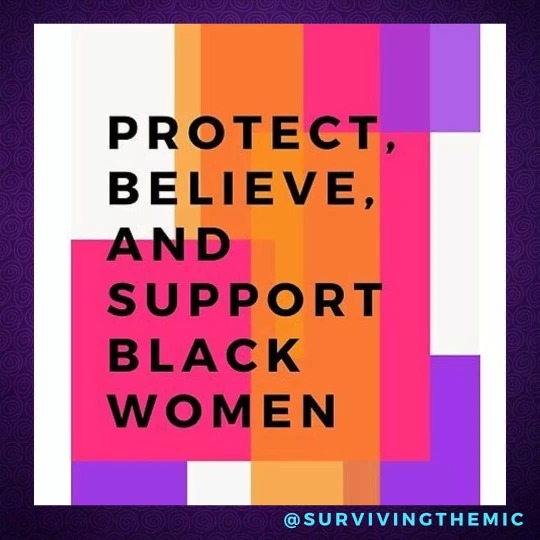#nikkipatin
Explore tagged Tumblr posts
Photo

PROTECT, BELIEVE, & SUPPORT BLACK WOMEN. . . . . If you know Black, Indigenous, or Lantina women impacted by COVID-19 message our friends-in-the-fight @socialpracticelabs to ask about the reflief fund, childcare supplies, and hot meals for families and individuals with mobility concerns. . Follow @survivingthemic on IG+ FB + TW Follow @socialpracticelabs on IG + FB and @thepracticelabs on TW . . . . . . #whm #breonnataylor #womensherstory #womxnshistorymonth #womenshistory #womenshistorymonth #womensherstorymonth #mutualaid #relieffunds #supportsurvivors #ripbreonnataylor #supportblackwomen #believesurvivors #survivorstories #survivorsspeak #socialpracticelabs #survivingthemic #nikkipatin #justiceforbreonnataylor #mojdehstoakley #blackhistory #blackherstory #blackwomen #blackpoetsspeakout #blackwomen #protectblackwomen #believeblackwomen #blackwomensupportingblackwomen #blackgirlmagic #blacktranswomen (at Chicago, Illinois) https://www.instagram.com/p/CMW44gUBXgy/?igshid=15abdn63h8yt8
#whm#breonnataylor#womensherstory#womxnshistorymonth#womenshistory#womenshistorymonth#womensherstorymonth#mutualaid#relieffunds#supportsurvivors#ripbreonnataylor#supportblackwomen#believesurvivors#survivorstories#survivorsspeak#socialpracticelabs#survivingthemic#nikkipatin#justiceforbreonnataylor#mojdehstoakley#blackhistory#blackherstory#blackwomen#blackpoetsspeakout#protectblackwomen#believeblackwomen#blackwomensupportingblackwomen#blackgirlmagic#blacktranswomen
7 notes
·
View notes
Photo

Founder, @nikkipatin kicks the door in at @survivingthemic #openmic with a song! #ThisIsAGoodNight #StrongVoices #Herstory #herstorys
0 notes
Text
Longtime Black, Queer Activist Creates Storytelling Space for Sexual Violence Survivors
by Derrick Clifton
May 22, 2014
For survivors of sexual abuse and trauma, silence isn’t always so golden. But a group of Chicago activists hope to foster an environment where sexual violence survivors feel empowered to speak through the pain, and to cope within community.
Launched in February by Nikki Patin, a Chicago-based queer advocate and artist, Surviving the Mic helps survivors express their pain and ongoing recovery within a safe, affirming atmosphere. Once each month, a clothing store in Chicago's Wicker Park neighborhood converts after hours into an improvised performance space. Patin, herself a survivor of sexual violence, aims to center her work primarily for Black, female-identified and LGBT people, fueled by what she perceives as widespread ignorance and misrepresentation.
“I’ve seen young people viciously beaten by the police. I’ve sat at the bedsides of people on suicide watch after they’d been raped,” Patin said. “And it’s not something that CNN or any of [the networks cover] ... it’s not an easy story to tell and no one is telling that story. That’s why I started this, because it’s a space for the stories that aren’t easy to tell.”
Patin’s work goes as far back as the early-to-mid 1990s, when she first began engaging LGBT activism as a queer student. She soon developed into an accomplished musician and spoken word artist, having delivered guest lectures at universities and venues across the globe, including a number of appearances on HBO’s Def Poetry Jam. In many ways, Patin's art mirrors her life’s work.
Cultural misunderstandings about rape and sexual assault fell on her radar for years. But the issue didn’t intersect with Patin's career until an incident arose at a high school where she worked. A Black, female student tearfully confided in Patin that she’d been raped by a senior staff member. Noting an administration’s lack of concern for the student’s well being, and even protection for the alleged offender on staff, Patin altered her trajectory and focused on advocacy for rape survivors. She said that, in her nearly two decades of being active in the community, the needs of Black women and LGBT people are top of mind during her efforts.
“You say the phrase [Black women or LGBT] and immediately I think “the least of these.” Not in terms of worth and not in terms of ability and certainly not in terms of intelligence or capability, but in terms of what they receive from their country,” Patin said. “When you look statistically and what [Black women] experience, we’re one of the most raped groups with the least amount of convictions.”
According to a 2014 report by the White House Council on Women and Girls, roughly 35 percent of multiracial women have been raped. Broken down by specific racial categories, the report states that 22 percent of Black women have been raped.
However, two other independent surveys challenge government estimates for Black women who experience sexual violence. In a 2007 report commissioned by the National Black Women’s Health Project, roughly 40 percent of Black women experienced coercive sexual contact before the age of 18. In addition, an independent, ongoing survey conducted by Black Women’s Blueprint estimates that 60 percent of Black women in the United States have experienced sexual assault. The organization, which works to promote social justice for Black women, has embarked on “Truth Commission” to build accountability for sexual assault survivors.
Patin works with Black Women’s Blueprint as a director of training and cultural programs.
As part of the program's launch, Patin and other community activists coordinated a 10-week training program that trained participants in how to share their stories in a compelling and creative way.
Tara Betts, a doctoral candidate in English at Binghamton University and longtime colleague of Patin’s, served as a guest facilitator during the training sessions. Betts said that Patin’s diverse skill set and cultural competence makes her a formidable advocate for women of color and LGBT people.
“Usually when you have all womens’ spaces, it’s predominantly white women. This was the first thing I’ve been in where it was focused on women of color, their voices and their stories,” Betts said.
Focusing on those stories hits home for Nikki, given her personal experience and past advocacy efforts. Even when the work is emotionally wrenching or subjects her to ridicule, she said, she finds a way to carry on.
“Unless Black women are willing to play a stereotypical role, or play respectability politics, they get no traction and no representation,” she said. “I cannot rest on that.”
#NikkiPatin#SurvivingTheMic#TakeBackOurLives#QPOC#QWOC#rapeculture#blackwomen#intersecitonality#racism#justice#socialjustice#spokenword#performanceart#storytelling#advocacy#lgbt#lgbtq#creativewriting#poetry#art#music#activism
0 notes